Public Participation Plan
Graphics and Cover Design
Jane Gillis
The preparation of this document was supported
by the Federal Highway Administration through
MassDOT 3C PL contract #105757 and the Federal Transit Administration through MassDOT 5303 contract #106374.
Central Transportation Planning Staff
Directed by the Boston Region Metropolitan
Planning Organization. The MPO is composed of
state and regional agencies and authorities, and
local governments.
Proposed Amendment 2019

To request additional copies of this document or copies in an accessible format, contact:
Central Transportation Planning Staff
State Transportation Building
Ten Park Plaza, Suite 2150
Boston, Massachusetts 02116
(857) 702-3700
(617) 570-9192 (fax)
(617) 570-9193 (TTY)
ctps@ctps.org
ctps.org
Notice of Nondiscrimination Rights and Protections to Beneficiaries
The Boston Region Metropolitan Planning Organization (MPO) operates its programs, services, and activities in compliance with federal nondiscrimination laws including Title VI of the Civil Rights Act of 1964 (Title VI), the Civil Rights Restoration Act of 1987, and related statutes and regulations. Title VI prohibits discrimination in federally assisted programs and requires that no person in the United States of America shall, on the grounds of race, color, or national origin (including limited English proficiency), be excluded from participation in, be denied the benefits of, or be otherwise subjected to discrimination under any program or activity receiving federal assistance. Related federal nondiscrimination laws administered by the Federal Highway Administration, the Federal Transit Administration, or both prohibit discrimination on the basis of age, sex, and disability. These protected categories are contemplated within the Boston Region MPO’s Title VI Programs consistent with federal interpretation and administration. Additionally, the Boston Region MPO provides meaningful access to its programs, services, and activities to individuals with limited English proficiency, in compliance with US Department of Transportation policy and guidance on federal Executive Order 13166.
The Boston Region MPO also complies with the Massachusetts Public Accommodation Law, M.G.L. c 272 §§ 92a, 98, 98a, prohibiting making any distinction, discrimination, or restriction in admission to or treatment in a place of public accommodation based on race, color, religious creed, national origin, sex, sexual orientation, disability, or ancestry. Likewise, the Boston Region MPO complies with the Governor's Executive Order 526, section 4 requiring all programs, activities, and services provided, performed, licensed, chartered, funded, regulated, or contracted for by the state shall be conducted without unlawful discrimination based on race, color, age, gender, ethnicity, sexual orientation, gender identity or expression, religion, creed, ancestry, national origin, disability, veteran’s status (including Vietnam-era veterans), or background.
To request additional information regarding Title VI and related federal and state nondiscrimination obligations, please contact:
Title VI Specialist
Boston Region MPO
10 Park Plaza, Suite 2150
Boston, MA 02116
857.702.3700
TTY: 617.570.9193
publicinfo@ctps.org
To file a complaint alleging a violation of Title VI or related federal nondiscrimination law, contact the Title VI Specialist (above) within 180 days of the alleged discriminatory conduct.
To file a complaint alleging a violation of the state's Public Accommodation Law, contact the Massachusetts Commission Against Discrimination within 300 days of the alleged discriminatory conduct at:
Massachusetts Commission Against Discrimination (MCAD)
One Ashburton Place, 6th Floor
Boston, MA 02109
617-994-6000
TTY: 617-994-6196
If this information is needed in another language, please contact the Boston Region MPO’s Title VI Specialist at 857.702.3701.
简体中文 (Simplified Chinese)
如果需要使用其它语言了解信息,请联系波士顿大都会规划组织 (Boston Region MPO) 《民权法案》第六章专员,电话 857.702.3701.
繁體中文 (Traditional Chinese)
如果需要使用其他語言瞭解資訊,請聯繫波士顿大都會規劃組織(Boston Region MPO)《民權法案》第六章專員,電話 857.702.3701.
Kreyòl Ayisyen (Haitian Creole)
Si yon moun vle genyen enfòmasyon sa yo nan yon lòt lang, tanpri kontakte Espesyalis Boston Region MPO Title VI la nan nimewo 857.702.3701.
Español (Spanish)
Si necesita esta información en otro idioma, por favor contacte la Boston Region MPO al 857.702.3701.
Português (Portuguese)
Caso estas informações sejam necessárias em outro idioma, por favor, contate o MPO da Região de Boston pelo telefone 857.702.3701.
Chapter 2—The Boston Region MPO’s Vision, Function, and Structure............. 15
2.2...... The Boston Region MPO................................................................. 16
2.2.1 The Boston Region MPO’s Central Vision................................ 18
2.2.2 Work of the Boston Region MPO........................................... 18
2.2.3 Composition of the Boston Region MPO.................................. 22
Current Membership............................................................ 22
MPO Staff: the Central Transportation Planning Staff................. 23
MPO Committees............................................................... 23
Chapter 3—The MPO’s Approach to Public Participation................................. 27
3.1...... Federal Requirements for Public Participation...................................... 27
3.2...... Updating the Public Participation Plan................................................ 28
3.3...... MPO Public Participation Vision and Guidelines................................... 28
3.4.1 How to Be Informed............................................................. 29
3.4.2 How to Be Involved............................................................. 31
MPO and MPO Committee Meetings...................................... 31
Regional Transportation Advisory Council................................ 32
MPO-Sponsored Meetings.................................................... 33
Workshops........................................................................ 33
General Information Sessions................................................ 34
TIP and UPWP Information Sessions...................................... 34
Forums............................................................................. 34
Special Topic Discussions.................................................... 35
Other Opportunities for Public Participation.............................. 35
Surveys............................................................................ 35
Public Information Email....................................................... 35
Website Comments............................................................. 35
MAPC Subregion Meetings and Coordinated Activities............... 35
MPO “Invite Us Over”.......................................................... 36
3.4.3 Notice of MPO Activities....................................................... 36
3.4.4 Access to MPO and MPO-Sponsored Meetings........................ 38
Transportation and Physical Access....................................... 38
Language Access............................................................... 38
3.4.5 Recent Opportunities for Public Involvement............................ 38
3.4.6 FTA Public Hearing Requirements.......................................... 39
Chapter 4—Public Participation Schedule and the Transportation Planning Process 41
4.1...... Public Participation Schedule for the TIP and UPWP............................. 41
4.3...... Public Participation Schedule for Changes to Certification Documents...... 43
4.3.1 Amendments to Certification Documents................................. 44
4.3.2 Administrative Modification of Certification Documents............... 47
4.4...... Public Participation Schedule for Longer-Time-Horizon Planning Activities. 47
4.4.1 Federal Recertification Reviews............................................. 47
4.4.2 The Transportation Equity Program........................................ 47
4.4.3 Development of the Public Participation Program and Plan.......... 48
Original 2014 Plan.............................................................. 48
Current Plan Update............................................................ 49
Figure 1 Purpose and Functions of the MPO
Figure 2 Relationship of MPO Certification Documents to other Transportation Planning Documents
Figure 3 Massachusetts MPO Regions
Figure 4 Boston Region MPO Area, MPO Municipal Members, and MAPC Subregions
Figure 5 Boston Region MPO Members
Figure 6 Ways to be Informed and Involved
Figure 7 Annual MPO Planning Cycle for Development of TIP, UPWP, and Public Participation
Appendix A Federal Public Participation Mandates
Appendix B MPO Memorandum of Understanding
Appendix C MPO-Sponsored Meetings and MPO Meetings Outside of Boston
Appendix D Definitions of Acronyms, Initialisms, and Abbreviations
This public participation plan documents the Boston Region Metropolitan Planning Organization’s (MPO) Public Participation Program, which comprises the various outreach activities that the MPO engages in to ensure that all members of the public—including populations that are described as traditionally underserved by the transportation system and/or have lacked access to the decision-making process—are given the opportunity to participate in the metropolitan transportation planning process that shapes the Boston region.
This plan provides information about the outreach activities in which the MPO engages, and the ways in which various federal civil rights mandates are incorporated into outreach activities to ensure inclusive participation. The plan includes in-depth descriptions of the various ways the public may be involved, the transportation planning and programming processes, and MPO meetings and activities. Also covered is the annual public engagement schedule for the MPO's three certification documents: Long-Range Transportation Plan, Transportation Improvement Program (TIP), and Unified Planning Work Program.
This update reflects recent changes in information and communication technologies and public participation practices, and a change in the public review period for the TIP from 30 to 21 days.
The purpose of this Public Participation Plan (the Plan) is to describe the Boston Region Metropolitan Planning Organization’s (MPO) Public Participation Program (the Program), which comprises the various outreach activities that the MPO engages in to ensure that all members of the public—including populations that have been underserved by the transportation system and/or have lacked access to the decision-making process—are given the opportunity to participate in the metropolitan transportation planning process that shapes the Boston region. The Plan guides the MPO's efforts to offer early, continuous, and meaningful opportunities for the public to help identify social, economic, and environmental impacts of proposed transportation policies, projects, and initiatives.
The Plan incorporates federal and state requirements (listed in Appendix A) for encouraging and ensuring community participation.
This most-recent update reflects recent changes in information and communication technologies and public participation practices, and a change in the public review period for the Transportation Improvement Program (TIP) from 30 to 21 days.
Chapter 2—The Boston Region MPO’s Vision, Function, and Structure
In accordance with federal laws and regulations, MPOs are established in urbanized areas across the nation to implement the federally required continuing, comprehensive, and cooperative (3C) transportation planning process. To be continuing, MPO work is conducted on an ongoing basis; to be comprehensive, the work covers all transportation modes, populations, and areas of the region, and addresses their individual needs; and to be cooperative, the work is performed in close communication and consultation with all of the region’s municipalities and a broad base of agencies, organizations, and interest groups.
The purpose of the MPO is to decide how to allocate federal funds for transit, roadway, bicycle, and pedestrian projects in the region it represents. The MPO also is responsible for setting the region’s transportation vision, goals, and objectives, and for completing the long- and short-range planning needed to program federal transportation funds.
Nationwide, there are more than 380 MPOs that conduct transportation planning in urbanized areas of more than 50,000 people. Each MPO has six core functions:
The end products of the MPO’s work are represented in studies, reports, technical memoranda, data on transportation issues in the region, and the three federally required certification documents discussed above: the LRTP, TIP, and UPWP. Because each MPO in the country must produce these three major documents to be certified by the federal government as eligible to program federal transportation funds, they are called certification documents.
Figure 1 illustrates the relationship between the purpose of the MPO and the six functions listed above.
These functions and other responsibilities of MPOs are described in federal laws and associated regulations. Transportation planning requirements and, specifically, the 3C process described earlier, date to the Federal-aid Highway Act of 1962 and are revised regularly. The most recent federal transportation legislation is Fixing America’s Surface Transportation Act (FAST Act).
Although all MPOs operate under the same federal guidance, there is great variability among MPOs, based on the geographic and political characteristics of the state and region in which they are located. Each is free to establish its own membership structure and define many other aspects of how it accomplishes its work. The following sections discuss the framework of Boston Region MPO specifically.
Figure 1
Purpose and Functions of the MPO
The MPO’s central vision, as stated in the MPO’s Long-Range Transportation plan, Charting Progress to 2040, both anticipates the future and responds to current needs. This vision has evolved over many years’ engagement in metropolitan transportation planning—a process that includes technical analyses and other studies of transportation needs and soliciting and incorporating the public’s views. Its central vision guides the MPO in all of its work, and paints a picture of the desired, future state for the region and its transportation network:
The MPO’s vision for the system’s future is a modern transportation system that is safe, uses new technologies, provides equitable access, excellent mobility, and varied transportation options—in support of a sustainable, healthy, livable, and economically vibrant region. The MPO understands that transportation is not a simple end in itself. People use various transportation modes because they want to move themselves and/or their goods from one place to another to accomplish innumerable purposes. These may be for commuting between work and home, home and school, or between home and other economic, health, administrative, or recreational activities or services. In brief, the function of transportation is to enable social interaction, commerce, and personal development and fulfillment. However, there are obstacles to serving these functions. Foremost is the combined lack of adequate funding and aging transportation infrastructure. In addition, the socio-demographic and economic patterns of the region are in transition. Because of the region’s aging population over the next 25 years, and forecasted in- versus out-migration, the region’s mobility and accessibility needs are evolving. The MPO is forging consensus about which projects are priorities for development and the density of their related economic and residential land uses. The MPO’s challenge is to maintain the transportation network to meet existing needs, and adapt and modernize it for future demand, while working within the reality of constrained fiscal resources.
As discussed above, the Boston Region MPO is responsible for carrying out the federally required 3C planning process and accomplishing core MPO functions, including development of the three certification documents—the LRTP, TIP, and UPWP.
Figure 2 depicts how these three documents are interrelated and how they connect with other processes and documents developed by the MPO (shown in blue) and to those of state and regional agencies (shown in green), such as the Massachusetts Bay Transportation Authority (MBTA). Other MPO documents and processes include the Congestion Management Process (CMP), Performance-based Planning and Programming, and studies that are programmed in the UPWP. Other state and regional planning initiatives include the MBTA’s Program for Mass Transportation and Capital Investment Program (CIP); Massachusetts Department of Transportation’s (MassDOT) CIP, State Transportation Improvement Program, and other planning initiatives; and transportation studies conducted by others.
Figure 2
Relationship of MPO Certification Documents to other Transportation Planning Documents
Figure 3
Massachusetts MPO Regions

In addition to the work previously described, the Boston Region MPO coordinates transportation planning with six other Massachusetts MPOs in the Boston Urbanized Area: the Central Massachusetts, Merrimack Valley, Montachusett, Northern Middlesex, Old Colony, and Southeastern Massachusetts metropolitan planning organizations. This work is accomplished through periodic meetings of the MPOs in the Urbanized Area. Figure 3 shows the areas served by Massachusetts’ 13 MPOs. In addition, all MPOs in Massachusetts meet with MassDOT and the federal transportation agencies approximately once a month to coordinate on statewide and MPO transportation planning activities.
A board of 22 state, regional, and municipal members who work cooperatively to make decisions about regional planning and funding priorities comprises the Boston Region MPO. The MPO has voted to add a seat to enhance the representation of public transportation providers on the MPO board. The MPO region encompasses 97 municipalities and approximately 1,360 square miles, stretching from Boston to Ipswich in the north, Marshfield in the south, and to approximately Interstate 495 in the west. It is home to more than three million people and approximately two million jobs. The diverse communities in the MPO area range from relatively rural communities, such as Dover, to the urban centers of Boston and Cambridge. Transportation planning must take into account demographic, cultural, environmental, and mobility diversity.
A Memorandum of Understanding establishes the MPO’s membership, composition, structure, committees, processes for developing its certification documents, voting rules, and more. The MPO will update this document once the details regarding transit representation have been determined.
Currently, the MPO's membership includes the following voting members:
Figure 4 shows the municipalities that belong to each of the eight MAPC subregional groups, and highlights the municipalities that currently hold seats on the MPO.
The MPO board also includes two nonvoting members:
The Secretary of Transportation (or a designee) chairs the MPO; the vice chair is currently the Executive Director of MAPC (or a designee).
Figure 5 shows the proportion of MPO seats held by different types of entities, such as transportation agencies and municipalities. It includes a place for the future transit representative.
Created in 1974, the Central Transportation Planning Staff (CTPS) serves as a comprehensive, multimodal transportation planning staff to the MPO. As such, it is responsible for carrying out the work of the 3C transportation planning process under the direction of the MPO. This includes authoring planning studies and other analyses identified in the UPWP, producing certification documents, and developing and maintaining technical tools, such as a travel demand model set, that help the MPO conduct its work.
Currently, the MPO has three standing committees that it relies on to fulfill specific functions. The MPO Chair appoints representatives to the committees from among MPO members. Each of the committees reviews issues within its area of responsibility and makes recommendations to the MPO for necessary actions.

Figure 4
Boston Region MPO Area, MPO Municipal Members, and MAPC Subregions
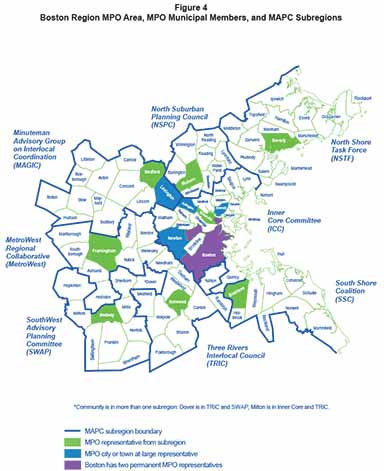
Figure 5
Boston Region MPO Members
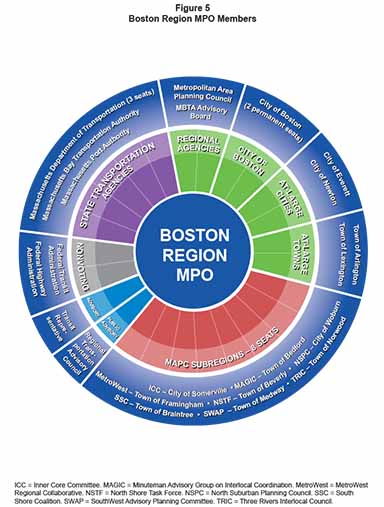
Chapter 3—The MPO’s Approach to Public Participation
The Boston Region MPO firmly believes that meaningful public participation should be integral to the organization’s transportation planning work. Public participation improves decision making by helping to illuminate many of the social, economic, and environmental benefits and drawbacks of transportation decisions.
As indicated in the introduction to this document, the MPO’s Program comprises activities that the MPO undertakes and materials that it produces to facilitate consultation on its planning and programming with all interested parties and members of the public. The Plan is the document (with text and graphics) that explains the Program and provides information about how to become involved in the MPO's transportation decision-making process through Program activities.
As discussed above, public participation is one of the six core functions of an MPO. Federal metropolitan transportation planning rules require MPO public participation plans to:
Other federal legislation, such as the Americans with Disabilities Act (ADA), and Title VI of the Civil Rights Act of 1964, also have public participation requirements that MPOs must implement to ensure access to the planning process for protected populations (please see Appendix A for a list of federal legislation). To meet these requirements, the MPO takes steps to include people with disabilities, minority and low-income populations, and those with limited English proficiency (LEP), as discussed throughout this Plan.
As indicated above, MPOs develop and update their public participation programs and plans in consultation with members of the public and other interested parties. Staff performs updates as needed to reflect changes in federal guidance, requirements and regional needs, and improvements in the state of the practice.
The Boston Region MPO approved its public participation plan in 2014. This update reflects recent changes in information and communication technologies and public participation practices, and a change in the public review period for the TIP from 30 to 21 days.
To ensure that the Program continues to evolve and reflect the most current and effective methods, MPO staff will adopt a regular, frequent and more rigorous process for gathering data and evaluating the MPO’s outreach practices, both quantitatively and qualitatively. Quantitative techniques include tracking the level of attendance at events, number of comments received, and use of the website. Qualitative measures include soliciting feedback from members of the public through surveys (both online and at meetings) about their satisfaction with process and outcome, and sense of fair treatment.
The MPO’s vision for public participation in the region is to hear, value, and consider—throughout its planning and programming work—the views of and feedback from the full spectrum of the public, and use this input in its decision making.
In order to accomplish its vision, the MPO has established a number of public participation guidelines, which have been updated to reflect the insights gained through its recent research. The MPO makes every effort to:
The MPO’s activities and programs are designed to meet the preferences and needs of the public. Activities and programs might include presentations, discussions, various venues for meetings and forums, information on the MPO website, flyers, and emails and other notification media.
A powerful tool in use by the MPO for outreach strategies is its website, which provides comprehensive information about all of the MPO’s work and planning activities, such as the following activities:
Staff also uses graphics to provide public information, such as flow charts, visualization techniques, and text boxes in narratives, in addition to and to augment written information.
To ensure web access for people with low or no vision who use screen readers, all documents are posted in both PDF and HTML versions. In addition, the MPO makes every effort to make data presented in tables fully navigable by a screen reader and provides alternative text to describe tables, figures, and images that cannot be read by a screen reader.
To make information more accessible for people with limited English proficiency, the website features a translation function for more than 100 languages other than English, including Chinese (simplified and traditional), French, Italian, Portuguese, Russian, and Spanish. In addition, vital documents are professionally translated into the three most frequently spoken languages other than English in the MPO region (Spanish, Chinese, and Portuguese), and these translated versions are posted on the website. The MPO also posts professionally translated executive summaries of the MPO’s three major transportation-planning documents—the LRTP, TIP, and UPWP—on the website. Staff reevaluates annually whether additional MPO documents should be identified as “vital documents,” to be translated into the languages of policy. Documents currently defined as vital include the following:
MPO staff posts audio recordings of MPO meetings on the website so that those who cannot attend meetings can listen to the discussions at any time. These recordings also provide easy access to meeting content for individuals with low or no vision or with low literacy.
The MPO also uses a variety of other tools to inform the public, including an email update, MPOinfo, with a contact list of more than 3,200 interested individuals and entities. The MPO also has email lists for Transportation Equity, the Advisory Council, and other interested parties. In general, MPOinfo updates focus on major MPO milestones, such as certification document amendments or announcements of public comment periods.
The MPO hosts a number of meetings and event types at which the public can learn about current MPO activities. Among these are the meetings of the MPO itself, meetings of MPO committees, and various public participation opportunities. One purpose of these meetings is to present and discuss information, solicit feedback, or gather input from the public on specific topics or plans to inform transportation planning and programming decisions for the region. The other purpose is to provide an open and constructive context in which those decisions are made by MPO members.
The MPO typically meets on the first and third Thursday of each month at 10:00 AM. Most meetings are held at the State Transportation Building, 10 Park Plaza, in Boston; however, quarterly, the MPO convenes its meeting off site in one of the MPO municipalities.
MPO meetings follow the general process below, which includes opportunities for public comment:
The three MPO standing committees, UPWP, CMP, and A&F meet as needed. As with MPO meetings, these committee meetings usually are held at the State Transportation Building, either before or after an MPO meeting. However, when necessary, committee meetings may be held off site in conjunction with an MPO meeting. Committee meetings are also open to the public.
To extend the public’s ability to provide input to the MPO, staff will research, and if feasible and useful, create a mechanism for submitting public comments on MPO agenda items in advance of meetings.
MPO staff addresses comments and responds to questions from individuals who attend MPO meetings or who contact them via telephone or email. Individuals with low or no vision or with low literacy are informed on the website and at meetings that they may submit comments via a recording or staff transcription of their spoken remarks before, during, or after MPO or MPO-sponsored meetings.
The Regional Transportation Advisory Council, also known as the Advisory Council, is an independent body that is a voting member of the MPO. The primary function of the Advisory Council is to advise the MPO on transportation policy and planning. Advisory Council meetings provide an ongoing avenue for public participation that invites informed involvement. The Advisory Council’s members are municipalities, professional organizations, transportation advocacy groups, and state and regional agencies. Members of the Advisory Council elect its own chair.
The Advisory Council provides advice to the MPO on a broad range of issues and may discuss topics that do not always exactly track those of the MPO meetings. Advisory Council meetings are designed to foster broad-based and robust discussions on transportation issues and topics related to planning and programming. Meetings are held monthly, generally on the second Wednesday, at 3:00 PM in the State Transportation Building, 10 Park Plaza, Boston.
Advisory Council meetings adhere to the same general process as MPO meetings. Although the agendas do not routinely include a specific item for public comment, at the discretion of the Chair, members of the public who are not Advisory Council members are allowed to speak and ask questions.
To improve the public participation opportunities offered by the Advisory Council, MPO staff will work with the Advisory Council to hold jointly sponsored programs and forums on timely transportation topics; solicit the Advisory Council’s views and ideas on specific, MPO-defined topics; and support the Advisory Council’s membership outreach to low-income, minority, and LEP populations, persons with disabilities, and other traditionally underrepresented populations.
As part of its Program, the MPO sponsors a variety of public-engagement opportunities, convened and managed by MPO staff. The purpose of these meetings is to provide information about MPO work underway and gather information and views from members of the public. Therefore, they are designed for as much interaction as possible among all in attendance. When appropriate, the transportation agencies are part of MPO-sponsored meetings.
The MPO often holds public meetings in areas with high concentrations of minority, low-income, and/or LEP populations to facilitate their inclusion. In addition, staff consults with personnel in host municipalities to learn about particular cultural or language issues that should be recognized and respected when planning and operating the meeting (for example, dates of community celebrations or observations and/or cultural preferences or restrictions).
MPO staff schedule workshop-type meetings in public venues in municipalities throughout the MPO region. These workshops are scheduled to coincide with the time period(s) when the MPO most needs input to its planning and when that input is most influential.
Workshops often include brief presentations followed by question and answer sessions. Subsequently, there are opportunities for one-on-one interactions between members of the public and MPO staff. Workshop formats may follow an exhibit-style format, with tables, staffed by program managers, set up for each major topic on the agenda. During these workshops, MPO staff invites participants to move from topic to topic as their interest guides. Materials may be available in a variety of media, such as print, large print, web based, PowerPoint slides, table-top display boards, and maps.
The MPO staff regularly conducts informational meetings at its offices in the State Transportation Building in Boston, which is a central location for the region.
Session topics include current MPO activities, such as development of the certification documents and updates on other MPO ongoing programs, but also may include detailed presentations and discussions about the results of MPO studies and reports. The format generally consists of staff presentations about programs and projects, followed by questions and answers. Staff is available after the presentations for individual follow-up discussion with meeting participants.
MPO staff conducts meetings at which topics are geared to representatives who prepare their municipality’s or other entity’s official inputs to the TIP and UPWP development processes. For example, staff hosts conference calls for municipal TIP contacts. Staff presents on the current year’s process and discusses any changes from previous years, followed by questions and answers. After the presentations, staff is available for a roll-up-the-sleeves style working session with individual participants.
MPO staff collaborates with other entities to convene regional forums on important topics. Forums are focused on issues of interest to particular constituencies and generally feature a panel of expert speakers with time for questions and answers. These forums are sometimes followed by breakout sessions in which small groups of participants may have more intimate discussions. The purpose is to foster communication and cooperation among disparate entities that deal with the issue under discussion, and to look for new solutions to existing problems. These meetings usually are held at the State Transportation Building.
The MPO occasionally brings together agencies and other entities to seek their input on specialized aspects of important topics in the metropolitan transportation planning process. Past special topic discussions have dealt with transportation equity and environmental issues.
In addition to the meeting opportunities discussed above, the MPO provides a number of other ways for the public to be involved in the planning process.
From time to time, the MPO conducts surveys to learn the views of members of the public on targeted topics. Respondents submit their ideas via survey tools on the MPO website. Staff presents the survey results to the MPO.
Members of the public can submit questions, comments, and ideas to the MPO and its staff via the publicinfo@ctps.org email address. Staff replies to these queries and uses information provided, as applicable. This email address is listed on meeting flyers and other MPO outreach materials.
The MPO website features a general comment section that viewers can reach from any page on the site. Using this function, members of the public are invited to submit a comment on any topic. Comments are directed to the appropriate staff-level program or project manager, who will respond to the comments and use this input, as appropriate. Comments submitted during a formal comment period for a document under review, and their associated staff responses, are summarized and reported to the MPO.
The MAPC has divided the municipalities in its area (which mostly coincides with the Boston Region MPO area) into eight subregions. The subregions convene their member municipalities regularly to discuss topics related to land use, urban and community planning, issues of general interest to local and regional planners, and transportation. MPO staff meets regularly with MAPC’s subregional coordinators and shares monthly updates for inclusion in the MAPC Matters newsletter. MPO staff attends subregional meetings as needed to discuss pertinent MPO activities, schedules, and issues and to gather the subregions’ and their municipalities’ views and priorities.
MPO staff asks transportation advocacy groups, professional organizations, transportation-equity organizations, and other such groups to invite staff to attend their regularly scheduled meetings to discuss transportation issues that are important to them. MPO staff gives presentations, answers questions, and gathers comments at these meetings. Staff will work to increase the number of “Invite-Us-Over” speaker events in order to bolster the MPO’s visibility and heighten the effectiveness of such events as an outreach strategy.
Figure 6 summarizes the various ways that members of the public can receive MPO information and be involved in MPO activities and decision making.
The MPO provides notification of meetings through the calendar on its website. MPO, MPO Committee, and Advisory Council meeting agendas and materials are posted on the MPO’s website one week in advance of the meeting, except in cases of emergency or other constrained circumstances.
MPO staff also posts information about MPO-sponsored meetings and sessions on the website calendar, and usually include a flyer announcing the day, time, and location of the gathering and the topics to be discussed. These flyers are translated into the three most commonly spoken languages other than English in the MPO region: Spanish, Portuguese, and Chinese. Links to related documents may be included under the meeting’s entry.
Figure 6
Ways to be Informed and Involved
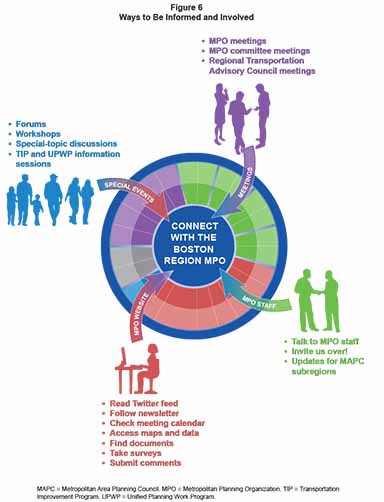
Flyers (as described above) are sent via the MPOinfo and Transportation Equity email lists, and to Advisory Council members and contact lists of other interested parties.
The MPO strives to make all meetings accessible to all members of the public, regardless of their transportation alternatives, mobility limitations, or language skills. The CTPS Nondiscrimination Handbook also contains protocols to ensure physical access to meeting venues.
All MPO-sponsored meetings are held in locations that are accessible to people with disabilities and are near public transportation.
To ensure accessibility for persons with disabilities, locations for meetings held outside the State Transportation Building are selected through a process that includes an on-site review of the meeting facilities. As part of this review, staff refers to an accessibility checklist with a list of physical characteristics necessary to accommodate individuals with a variety of mobility limitations.
When selecting meeting venues, staff consults the MPO's Language Assistance Plan (LAP), which was developed as part of the Title VI program. The LAP identifies location of LEP populations; provides information regarding languages into which materials may need to be translated, based on the meeting location; and describes the language services that will be provided.
The MPO has prepared a summary of all public-involvement meetings since January 2016. This summary, found in Appendix C, includes MPO-sponsored public meetings and forums that were held specifically for the purpose of public participation and MPO meetings that were held outside of Boston, as of the end of December 2018.
Not listed are the regularly scheduled Boston meetings of the MPO, the three MPO standing committees, and the Advisory Council. All of these meetings are open to the public and provide opportunities for public input, as discussed above.
The MBTA, Cape Ann Transportation Authority, and MetroWest Regional Transit Authority, which are FTA Section 5307(c) applicants, have consulted with the MPO and concur that the public involvement process adopted by the MPO for the development of the TIP satisfies the public hearing requirements that pertain to the development of the Program of Projects for regular Section 5307, Urbanized Area Formula Program, grant applications, including the provision for public notice and the time established for public review and comment.
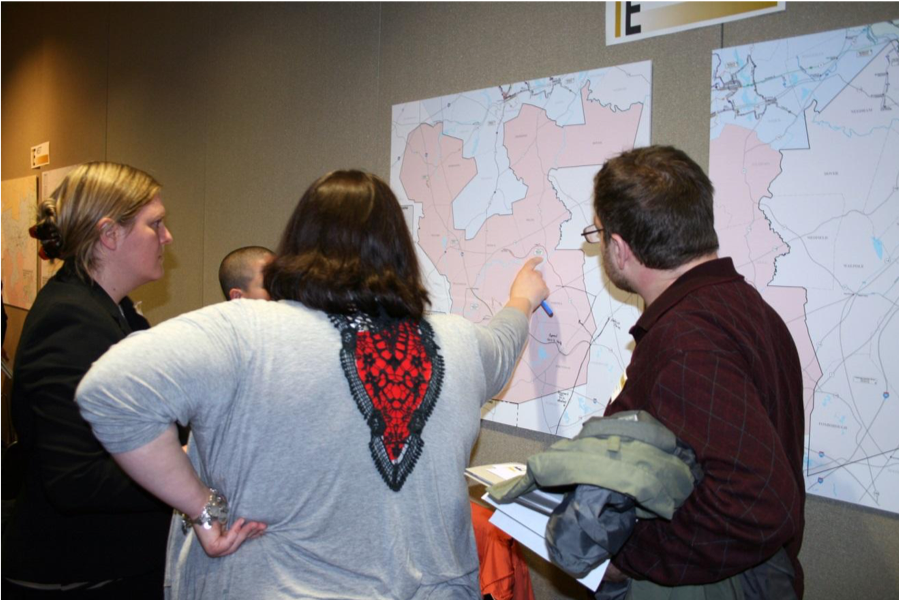
Chapter 4—Public Participation Schedule and the Transportation Planning Process
Work for the metropolitan transportation planning process occurs year-round. This includes developing the certification documents and the other programs and studies conducted as part of the process. Development of the certification documents follows established cycles as depicted in Figure 7. Public outreach to support this work follows the same cycles. The MPO makes the public aware of the details of each year’s public participation timeframes at the beginning of the federal fiscal year to assure predictability for those who wish to participate in the transportation planning process. Public participation opportunities for other MPO programs, such as Transportation Equity, and some studies occur throughout the year, as needed.
At the beginning of each federal fiscal year, the MPO develops and posts its schedule of certification activities, laying out its plans for developing the certification documents due in that year and for conducting the other planning work scheduled to be accomplished.
The development of the TIP and UPWP typically move forward in tandem on the following schedule.
October
November–December
January
The MPO follows an annual schedule for development of the TIP and UPWP.
MPO staff receives information on new TIP projects and develops ideas for possible studies to include in the UPWP universe of study proposals
February
April
April through May
May to June
October 1
Figure 7 shows the MPO’s annual process for producing the TIP and the UPWP and any related public participation opportunities.
The LRTP is updated every four years, although some LRTP work is ongoing. A specific public participation plan is developed for each LRTP update. The most significant public participation takes place during the fourth year, leading up to endorsement of the LRTP update. Although the public participation schedule is different for the LRTP, it follows the same general sequence and set of outreach tools used for the TIP and UPWP, and if possible public participation activities for the LRTP are coordinated with TIP and UPWP outreach. The draft LRTP is released for a public comment period that lasts 30 days.
The certification documents are dynamic—they can be modified or amended to reflect changes made throughout the course of a typical federal fiscal year, for example, revisions to project scopes; changes in cost; new project schedules; new projects added or programmed projects removed. These changes are made through the processes of administrative modification or amendment.
For the TIP, consistent with federal guidelines, if a project is valued at $5 million or less, the threshold for defining a change to the project as an amendment is a change of $500,000 or more. The threshold for projects valued at greater than $5 million is 10 percent or more of the project value. Changes below these thresholds may be considered administrative modifications. Any changes to the LRTP generally are considered amendments. Changes to the UPWP are infrequent; however, the addition or deletion of an MPO-funded study or program may trigger an amendment.
Amendments to any of the three certification documents—LRTP, TIP, and UPWP—follow the same public process, as described below.
When the MPO considers amending one of its certification documents, it votes to do so at an MPO meeting. MPO staff then posts the proposed draft amendment on the MPO’s website and a public comment period begins. The public comment periods last 21 days for TIP amendments and 30 days for UPWP or LRTP amendments.
The MPO notifies the Advisory Council and affected municipalities and constituencies of pending amendments to inform them about the proposed changes, when and where decisions will be made, and how they can provide comments. The MPO informs members of the public by posting notices of pending amendments on the MPO website and distributes the notices through its email lists. The MPO also informs TIP contacts and proponents of affected projects.
In extraordinary circumstances, such as an unforeseen regulatory requirement or funding deadline, the MPO may vote to shorten the public comment period to a minimum of 15 days. In emergency circumstances, such as the need to take immediate action to protect public safety or take advantage of an extraordinary funding opportunity, the MPO may wave the comment period.
The MPO may extend a public comment period an additional 15 days if a proposed amendment is significantly altered during the initial public comment period. If a significant alteration occurs after the close of the initial public comment period, the MPO may schedule an additional comment period lasting 21 days for TIP amendments and 30 days for UPWP or LRTP amendments.
MPO staff collects public comments and relays them to the MPO in both summary form and full text as submitted. MPO members review and consider these comments as they decide what action to take regarding the proposed amendment.
Figure 7
Annual MPO Planning Cycle for Development of TIP, UPWP, and Public Participation
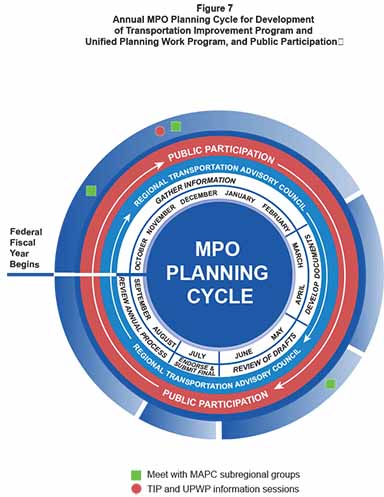
Changes to certification documents that do not rise to the level of an amendment may be addressed through an administrative modification. The MPO may decide to make an administrative modification without issuing a public comment period, though one may be scheduled, at the MPO’s discretion. If one is scheduled, public notification follows the same process that is used for amendments.
There are many activities at the MPO that have longer or less predictable time horizons. The public participation schedules for these events, therefore, are tailored to the specific event and its timing.
Federal recertification reviews are conducted every four years. At this time, the federal transportation agencies evaluate the programs and activities of the MPO to determine whether they are in keeping with the required 3C process. If so, the federal agencies certify that the MPO is operating as it should. A recertification review is conducted, typically over the course of a work week, in a series of public sessions. Members of the public are invited to attend and participate. They also are invited to submit written comments before and during the review sessions. The federal agencies may contact certain parties to hear their views on MPO programming and operations, including public participation. The material prepared for the recertification review and the report of the federal agencies is posted on the MPO’s website. The most recent recertification review began in the summer of 2018.
The MPO’s Transportation Equity program is ongoing. This program is the MPO’s method of consulting people who identify as minorities, have limited English proficiency, are 75 years old or older, are 17 years old or younger, have a disability, or are members of low-income households. The MPO primarily engages with groups representing these populations’ interests in order to identify the transportation needs of protected populations and promote their involvement in the planning process.
The program focuses on outreach to organizations serving communities with high shares of protected populations. These organizations and other community contacts are involved in, and knowledgeable about, the transportation issues and needs of their areas. Contacts include social-service organizations, community-development corporations, neighborhood organizations, civic groups, business and labor organizations, transportation advocates, environmental groups, and environmental-justice and civil-rights groups. The MPO also communicates with the Statewide Mobility Management Program and its Regional Coordinating Council.
Transportation equity is also a frequent topic at MPO workshops and information sessions. In addition to soliciting public feedback at these events, staff conducts surveys to seek input from persons who identify as belonging to one or more protected populations and from organizations that represent those populations.
The MPO reviews the Program’s progress and effectiveness on an ongoing basis, and updates both the Program and Plan accordingly. The MPO performs updates as needed to reflect changes in federal guidance, requirements and regional needs, and improvements in the state of the practice, and occur in consultation with members of the public and other interested parties.
Outreach for this Plan began in the spring of 2013 in tandem with MPO outreach of the draft TIP and UPWP; discussions were held at two public workshops and two “Be Informed, Be Involved Sessions” in 2013. In addition, in 2013, the MPO conducted surveys through its MPOinfo email list, TRANSreport, public workshops, and the website. Public input gathered through this process and from the MPO was incorporated into a draft Plan that was circulated for a 45-day public review process in August 2014.
During the public review process, the draft Plan was posted on the MPO website and discussed with the Advisory Council. In addition, four MPO public workshops were held to provide information and solicit feedback, and information was made available at the Fall Forum for the LRTP. The public was notified about the public review process via TRANSreport, MPOinfo emails, website News Flashes, a press release, and an MPO Tweet. As discussed elsewhere in this document, information from the public outreach process helped guide the changes reflected in this final document. The MPO approved this document on October 16, 2014.
The MPO will conduct a 45-day public review process for this Plan amendment, during which the draft Plan will be posted on the MPO website. The public will be notified about the public review process via TRANSreport, MPOinfo emails, website News Flashes, a press release, and an MPO Tweet.
Appendix A—Federal Public Participation Mandates
The federal regulations concerning public participation in metropolitan transportation planning decision making are specified in Title 23, Section 450.316, of the Code of Federal Regulations (CFR). These regulations require that public-involvement processes be proactive and provide complete information, timely public notice, full public access to key decisions, and opportunities for early and continuing involvement; they leave the choice of methods for facilitating participation to the discretion of each MPO. The regulations specify that public participation processes must provide:
This section specifies the public participation requirements for MPO planning studies and project development.
This section specifies the public participation requirements for the development and content of the MPO's LRTP.
This section specifies the public participation requirements for the development and content of the MPO's TIP.
This section specifies that MPOs certify at least every four years that the metropolitan transportation planning process is being carried out in accordance with all applicable requirements including:
The Americans with Disabilities Act of 1990 states that “no qualified individual with a disability shall, by reason of such disability, be excluded from participation in or be denied the benefits of services, programs, or activities of a public entity, or be subjected to discrimination by any such entity.” Therefore, ADA requires that locations for public participation activities, as well as the information presented, must be accessible to persons with disabilities.
Title VI of the Civil Rights Act of 1964, together with related statutes and regulations, provides that “no person in the United States shall, on the ground of race, color, or national origin be excluded from participation in, be denied the benefits of, or be subjected to discrimination under any program or activity receiving Federal financial assistance.” The entire institution, whether educational, private or governmental, must comply with Title VI and related federal civil rights laws, not just the program or activity receiving federal funds.
FTA C 4702.1B (2012), Title VI Requirements and Guidelines for Federal Transit Administration Recipients, provides guidance on promoting inclusive public participation. This circular recommends seeking out and considering the viewpoints of minority, low-income, and LEP populations when conducting public outreach and involvement activities. It identifies the following effective practices for fulfilling the inclusive public participation requirement:
Executive orders and regulations regarding environmental justice (EJ) also include public participation mandates for recipients of federal funds and their subrecipients.
This executive order states that “each Federal agency shall make achieving environmental justice part of its mission by identifying and addressing, as appropriate, disproportionately high and adverse human health or environmental effects of its programs, policies, and activities on minority populations and low-income populations.” Traditionally underserved groups such as low-income and minority populations must be identified and given increased opportunity for involvement in order to ensure effective participation.
This executive order requires that recipients of federal financial aid ensure that their programs and activities that are normally provided in English are accessible to persons with limited English proficiency.
Appendix B—MPO Memorandum of Understanding
MPO Memorandum of Understanding
Appendix C—MPO-Sponsored Meetings and MPO Meetings Outside of Boston
| Date |
Location |
Equity Populations Focus? |
Type of Event |
Participants |
Topics Discussed |
|---|---|---|---|---|---|
January 12, 2016 |
Chelsea |
No |
TIP and UPWP workshop |
General public |
UPWP and TIP development |
February 17, 2016 |
Cambridge |
No |
350MA member meeting |
350MA |
Introduction to the MPO |
August 22, 2016 |
Boston |
No |
MBTA ROC member meeting |
MBTA Rider Oversight Committee |
Introduction to the MPO |
November 9, 2016 |
Wakefield |
No |
NSPC subregional meeting |
NSPC subregion |
UPWP and TIP development |
November 10, 2016 |
Holliston |
No |
MWRC subregional meeting |
MWRC subregion |
UPWP and TIP development |
November 15, 2016 |
Norwood |
No |
TRIC subregional Meeting |
TRIC subregion |
UPWP and TIP development |
November 15, 2016 |
Danvers |
No |
NSTF subregional meeting |
NSTF subregion |
UPWP and TIP development |
November 16, 2016 |
Boston |
No |
ICC subregional meeting |
ICC subregion |
UPWP and TIP development |
November 17, 2016 |
Hingham |
No |
SSC subregional meeting |
SSC subregion |
UPWP and TIP development |
December 1, 2016 |
Boston |
No |
MBTA ROC member meeting |
MBTA Rider Oversight Committee |
UPWP and TIP development |
December 13, 2016 |
Sherborn |
No |
SWAP subregional meeting |
SWAP subregion |
UPWP and TIP development |
December 15, 2016 |
Natick |
No |
MWRC subregional meeting |
MWRC subregion |
UPWP and TIP development |
January 5, 2017 |
Concord |
No |
MAGIC subregional meeting |
MAGIC subregion |
UPWP and TIP development |
April 26, 2017 |
Boston |
No |
MPO Open House |
Public |
TIP draft program |
May 16, 2017 |
Boston |
No |
MPO Open House |
Public |
UPWP draft program |
September 19, 2017 |
Norwood |
No |
TRIC subregional Meeting |
TRIC subregion |
LRTP, UPWP, and TIP development |
October 10, 2017 |
Wrentham |
No |
SWAP subregional meeting |
SWAP subregion |
LRTP, UPWP, and TIP development |
October 26, 2017 |
Hingham |
No |
SSC subregional meeting |
SSC subregion |
LRTP, UPWP, and TIP development |
November 2, 2017 |
Concord |
No |
MAGIC subregional meeting |
MAGIC subregion |
LRTP, UPWP, and TIP development |
November 9, 2017 |
Reading |
No |
NSPC subregional meeting |
NSPC subregion |
LRTP, UPWP, and TIP development |
November 9, 2017 |
Peabody |
No |
NSTF subregional meeting |
NSTF subregion |
LRTP, UPWP, and TIP development |
November 14, 2017 |
Natick |
No |
MWRC subregional meeting |
MWRC subregion |
LRTP, UPWP, and TIP development |
November 28, 2017 |
Westborough |
No |
495 MetroWest Partnership Transportation Committee meeting |
495 MetroWest Partnership Transportation Committee |
LRTP, UPWP, and TIP development |
November 29, 2017 |
Cambridge |
No |
LRTP workshop |
LivableStreets Advocacy Committee |
LRTP Needs Assessment |
January 3, 2018 |
Brookline |
Yes |
LRTP workshop |
TRIPPS |
LRTP Needs Assessment |
January 17, 2018 |
Boston |
No |
ICC subregional meeting |
ICC subregion |
LRTP, UPWP, and TIP development |
February 15, 2018 |
Boston |
No |
MBTA ROC member meeting |
MBTA Rider Oversight Committee |
LRTP, UPWP, and TIP development |
March 27, 2018 |
Boston (downtown) |
Yes |
Boston Summit on Disabilities |
People with a disability |
Transportation needs for people with a disability |
March 28, 2018 |
Foxborough |
No |
Bridging Transportation Gaps in Neponset Valley Forum |
TRIC region |
LRTP needs assessment |
May 1, 2018 |
Malden |
Yes |
LRTP Workshop |
Boston North Regional Coordinating Council |
LRTP Needs Assessment |
May 21, 2018 |
Boston (Roxbury) |
Yes |
DI/DB policy working group |
Project stakeholders and general public |
DI/DB policy |
June 5, 2018 |
Boston (Roxbury) |
Yes |
DI/DB policy working group |
Project stakeholders and general public |
DI/DB policy |
June 26, 2018 |
Boston (Roxbury) |
Yes |
DI/DB policy public workshop |
General public |
DI/DB policy |
July 17, 2018 |
Boston (Roxbury) |
Yes |
DI/DB policy working group |
Project stakeholders and general public |
DI/DB policy |
November 13, 2018 |
Norwood |
No |
TRIC subregional meeting |
TRIC subregion |
LRTP, UPWP, and TIP development |
November 15, 2018 |
Burlington |
No |
NSPC subregional meeting |
NSPC subregion |
LRTP, UPWP, and TIP development |
November 27, 2018 |
Westborough |
No |
495 MetroWest Partnership Transportation Committee meeting |
495 MetroWest Partnership Transportation Committee |
LRTP, UPWP, and TIP development |
November 28, 2018 |
Boston |
No |
ICC subregional meeting |
ICC subregion |
LRTP, UPWP, and TIP development |
November 29, 2018 |
Natick |
No |
MWRC subregional meeting |
MWRC subregion |
LRTP, UPWP, and TIP development |
December 4, 2018 |
Norwood |
Yes |
Neponset Valley RCC Meeting |
Neponset Valley Coordinating Council |
Coordinated Plan development |
December 11, 2018 |
Milford |
No |
SWAP subregional meeting |
SWAP subregion |
LRTP, UPWP, and TIP development |
December 12, 2018 |
Boston |
Yes |
Boston Area RCC meeting |
Boston Area RCC |
Coordinated Plan development |
December 18, 2018 |
Danvers |
No |
NSTF subregional meeting |
NSTF subregion |
LRTP, UPWP, and TIP development |
DI/DB = Disparate Impact and Disproportionate Burden. ICC = Inner Core Committee. LRTP = Long-Range Transportation Plan. MAGIC = Minuteman Advisory Group on Interlocal Coordination. MWRC = MetroWest Regional Collaborative. NSPC = North Suburban Planning Council. NSTF = North Shore Task Force. RCC = Regional Coordinating Council. ROC = Rider Oversight Committee. SSC = South Shore Coalition. SWAP = South West Advisory Planning Committee. TIP = Transportation Improvement Program. TRIC = Three Rivers Interlocal Council. TRIPPS = Transportation Resources, Information, Planning & Partnerships for Seniors. UPWP = Unified Planning Work Program.
Appendix D—Definitions of Acronyms, Initialisms, and Abbreviations
3C process = continuing, comprehensive, and cooperative transportation planning process
A&F = Administration and Finance
ADA = Americans with Disabilities Act
Advisory Council = Regional Transportation Advisory Council
CFR = Code of Federal Regulations
CIP = Capital Investment Program
CMAQ = Congestion Mitigation and Air Quality Improvement Program
CMP = Congestion Management Process
CTPS = Central Transportation Planning Staff
EJ = Environmental Justice
FAST Act = Fixing America’s Surface Transportation Act
FHWA = Federal Highway Administration
FTA = Federal Transit Administration
HTML = Hypertext Markup Language
ICC = Inner Core Committee
LAP = Language Assistance Plan
LEP = Limited English Proficiency
LRTP = Long-Range Transportation Plan
MAGIC = Minuteman Advisory Group on Interlocal Coordination
MAPC = Metropolitan Area Planning Council
MARPA = Massachusetts Association of Regional Planning Agencies
MassDOT = Massachusetts Department of Transportation
MBTA = Massachusetts Bay Transportation Authority
MetroWest = MetroWest Regional Collaborative
MOU = Memorandum of Understanding
MPO = Metropolitan Planning Organization
NSPC = North Suburban Planning Council
NSTF = North Shore Task Force
PDF = Portable Document Format
PMT = The MBTA’s Program for Mass Transportation
RSS = Rich Site Summary
SAFETEA-LU = The Safe, Accountable, Flexible, Efficient Transportation Equity Act: A Legacy for Users
SSC = South Shore Coalition
STIP = State Transportation Improvement Program
SWAP = Southwest Advisory Planning Committee
TE = Transportation Equity
TIP = Transportation Improvement Program
TRIC = Three Rivers Interlocal Council
UPWP = Unified Planning Work Program
USC = United States Code
USDOT = United States Department of Transportation
The purpose of this circular is to provide recipients and subrecipients of FTA financial assistance with guidance in order to incorporate EJ principles into their plans, projects, and activities. The circular identifies full and fair participation by all potentially affected communities in the transportation decision-making process as one of the guiding principles of EJ. The circular provides strategies and techniques for public engagement that are intended to help recipients and subrecipients identify the needs and priorities of EJ populations to inform the planning process and help balance the benefits and burdens of transportation decisions.